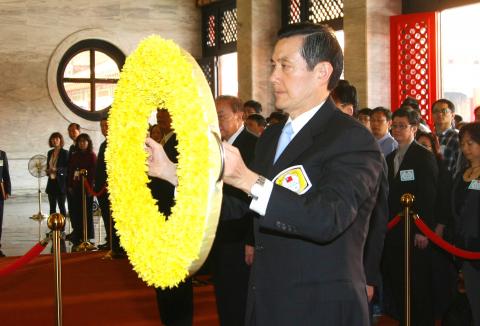President Ma Ying-jeou (馬英九) yesterday presided over a ceremony in honor of the Yellow Emperor (Huangdi, 黃帝), the mythical ancestor of the Han Chinese, drawing criticism from opposition politicians who slammed it as a move that demonstrated Ma’s hidden goal of “ultimate unification” with China.
Attended by Premier Sean Chen (陳冲), Legislative Speaker Wang Jin-pyng (王金平), Judicial Yuan President Rai Hau-min (賴浩敏), Control Yuan President Wang Chien-hsien and other Cabinet members, Ma led a memorial ceremony held at Taipei Martyrs’ Shrine for the legendary Yellow Emperor, the second time since Ma took office in 2008.
Ma is the first president to preside over such a commemorative ceremony for the Yellow Emperor since Chiang Kai-shek’s (蔣介石) Chinese Nationalist Party (KMT) retreated to Taiwan in 1949.

Photo: CNA
Democratic Progressive Party (DPP) Legislator Chen Chi-mai (陳其邁) yesterday said the government’s “worship” of the Yellow Emperor demonstrated Ma’s genuine identification with China, adding that the president sought to trace his ancestry to China through the ritual ceremony.
“Ma has culturally traced his ancestry to China by touting the ‘one China, two areas’ concept, suggesting that he regards the Han [Chinese] culture as the entirety of Taiwanese culture and exposing his China-centric arrogance,” Chen said.
DPP Legislator Tsai Chi-chung (蔡其昌) questioned how Ma had the time to worship the Yellow Emperor when public outrage is mounting over surging commodity prices.
Taiwan Solidarity Union caucus whip Hsu Chung-hsin (許忠信) also criticized Ma over the ceremony, saying it was China-centric and demonstrated the president’s intention of “ultimate unification.”
Cheng Ching-jen (鄭欽仁), a retired history professor from National Taiwan University, raised concerns over the case, saying the KMT was “singing in chorus with the Chinese Communist Party [CCP] to push a ‘unification of the mind.’”
All the past dynasties in China had maintained that the Yellow Emperor founded China as a nation more than 5,000 years ago, Cheng said, adding that the hidden agenda of those empires was to rationalize their acts of aggression and annexations of other nations by citing the myth as their “legitimacy of inheritance” that all ethnicities came from the “same blood line.”
This notion was maintained even under the governance of the CCP, which advocated official atheism, Cheng said, suggesting that China is using the myth to legitimize its ambition of unification with Taiwan.
“President Ma should propagate Taiwan’s democracy, liberalism, human rights doctrine, as well as the concept of ethnic equality to China, rather than attempting to achieve a ‘unification of the mind’ by chanting nationalism or the myth of the Yellow Emperor in chorus with China,” Cheng said.
The sight of Ma mobilizing high-ranking officials to administer the ritual as if it were a national ceremony was absurd, Cheng said, adding that the ritualism was a hangover from Chiang’s totalitarian regime and a tool of “political brainwashing.”
In response, the Presidential Office denied that the ceremony was politically motivated.
The Yellow Emperor is an ancestor of all zhonghua minzu (中華民族), or “Chinese people,” the Presidential Office said.
The Presidential Office also said that ancestor-worship was of the utmost importance to the Chinese people and is also a significant part of the national virtues of Taiwanese which transcends politics.
It shows the government’s wish that Taiwan will become the leader of Chinese culture, the office said.
The office said Ma has made his cross-strait policies clear and has prioritized the interests of Taiwan and its people in cross-strait relations, adding the Ma -government would firmly safeguard the -sovereignty of the Republic of China, defend the dignity of the nation and endeavor to achieve peaceful and prosperous cross-strait development.
Additional reporting by CNA
Translated by Stacy Hsu, Staff Writer

FORCED LABOR: A US court listed three Taiwanese and nine firms based in Taiwan in its indictment, with eight of the companies registered at the same address Nine companies registered in Taiwan, as well as three Taiwanese, on Tuesday were named by the US Department of the Treasury’s Office of Foreign Assets Control (OFAC) as Specially Designated Nationals (SDNs) as a result of a US federal court indictment. The indictment unsealed at the federal court in Brooklyn, New York, said that Chen Zhi (陳志), a dual Cambodian-British national, is being indicted for fraud conspiracy, money laundering and overseeing Prince Holding Group’s forced-labor scam camps in Cambodia. At its peak, the company allegedly made US$30 million per day, court documents showed. The US government has seized Chen’s noncustodial wallet, which contains

SUPPLY CHAIN: Taiwan’s advantages in the drone industry include rapid production capacity that is independent of Chinese-made parts, the economic ministry said The Executive Yuan yesterday approved plans to invest NT$44.2 billion (US$1.44 billion) into domestic production of uncrewed aerial vehicles over the next six years, bringing Taiwan’s output value to more than NT$40 billion by 2030 and making the nation Asia’s democratic hub for the drone supply chain. The proposed budget has NT$33.8 billion in new allocations and NT$10.43 billion in existing funds, the Ministry of Economic Affairs said. Under the new development program, the public sector would purchase nearly 100,000 drones, of which 50,898 would be for civil and government use, while 48,750 would be for national defense, it said. The Ministry of

SENATE RECOMMENDATION: The National Defense Authorization Act encourages the US secretary of defense to invite Taiwan’s navy to participate in the exercises in Hawaii The US Senate on Thursday last week passed the National Defense Authorization Act (NDAA) for Fiscal Year 2026, which strongly encourages the US secretary of defense to invite Taiwan’s naval forces to participate in the Rim of the Pacific (RIMPAC) exercise, as well as allocating military aid of US$1 billion for Taiwan. The bill, which authorizes appropriations for the military activities of the US Department of Defense, military construction and other purposes, passed with 77 votes in support and 20 against. While the NDAA authorizes about US$925 billion of defense spending, the Central News Agency yesterday reported that an aide of US

UNITED: The other candidates congratulated Cheng on her win, saying they hoped the new chair could bring the party to victory in the elections next year and in 2028 Former Chinese Nationalist Party (KMT) lawmaker Cheng Li-wun (鄭麗文) yesterday won the party’s chair election with 65,122 votes, or 50.15 percent of the votes. It was the first time Cheng, 55, ran for the top KMT post, and she is the second woman to hold the post of chair, following Hung Hsiu-chu (洪秀柱), who served from 2016 to 2017. Cheng is to succeed incumbent Eric Chu (朱立倫) on Nov. 1 for a four-year term. Cheng said she has spoken with the other five candidates and pledged to maintain party unity, adding that the party would aim to win the elections next year and